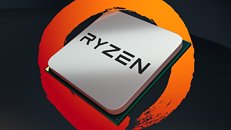Raevenlord
News Editor
- Joined
- Aug 12, 2016
- Messages
- 3,755 (1.20/day)
- Location
- Portugal
| System Name | The Ryzening |
|---|---|
| Processor | AMD Ryzen 9 5900X |
| Motherboard | MSI X570 MAG TOMAHAWK |
| Cooling | Lian Li Galahad 360mm AIO |
| Memory | 32 GB G.Skill Trident Z F4-3733 (4x 8 GB) |
| Video Card(s) | Gigabyte RTX 3070 Ti |
| Storage | Boot: Transcend MTE220S 2TB, Kintson A2000 1TB, Seagate Firewolf Pro 14 TB |
| Display(s) | Acer Nitro VG270UP (1440p 144 Hz IPS) |
| Case | Lian Li O11DX Dynamic White |
| Audio Device(s) | iFi Audio Zen DAC |
| Power Supply | Seasonic Focus+ 750 W |
| Mouse | Cooler Master Masterkeys Lite L |
| Keyboard | Cooler Master Masterkeys Lite L |
| Software | Windows 10 x64 |
Yesterday, we covered how Ryzen's performance has seen a needed lift-up through an upcoming update to Ashes of the Singularity: Escalation. Performance improvements of up to 30% do wonders in bringing up the 8-core, 16-thread Ryzen 7 1800X's performance up to speed with its svelter gaming enemy, the 4-core, 8-thread i/ 7700K. And through a community update, AMD has now shed some light on the ongoing crusade for adapting an entire ecosystem to its Ryzen line of processors architecture features. Case in point: BIOS updates and game patches,

BIOS updates are incoming which, according to AMD's own Robert Hallock, build upon AMD's AGESA (AMD Generic Encapsulated Software Architecture) version 1.0.0.4 - which is essentially the precursors for any BIOS file, being "responsible for initializing AMD x86-64 processors during boot time, acting as something of a "nucleus" for the BIOS updates you receive for your motherboard". Hallock mentions how BIOSes based on this AGESA release will bring improvements towards the Ryzen ecosystem:
So, latency is improved, and that FMA3 bug is reportedly getting fixed. These take care of the BIOS part of the equation, with AMD promising the release of a new AGESA version in May that "focuses on overclocked DDR4 memory."
Other than that, a new game has received a patch which improves performance under an AMD Ryzen 7 system - DOTA 2, one of the most successful MOBAs ever released. This update, dated March 20 - sorry for the "slight" delay - brought about "Improved threading configuration for AMD Ryzen processors." This is a game whose developers didn't publicly commit to exploring performance penalties of their game code running on a Ryzen 7 processor, but who introduced a game update that improved performance on those conditions. On a system configured with AMD Ryzen7 1800X Processor, 2x8GB DDR4-2933 (15-17-17-35), GeForce GTX 1080 (378.92 driver), Gigabyte GA-AX370-Gaming5, Windows 10 x64 build 1607, and a 1920x1080 resolution, Hallock reports 15% higher minimum framerates (from 79 to 91), lowering input latency by around 1.7ms.

One can hope that this momentum of updates and platform support from both AMD and developers continues, and builds up to an ecosystem that has embraced the rise (eh) of another truly competitive x86 architecture.
View at TechPowerUp Main Site

BIOS updates are incoming which, according to AMD's own Robert Hallock, build upon AMD's AGESA (AMD Generic Encapsulated Software Architecture) version 1.0.0.4 - which is essentially the precursors for any BIOS file, being "responsible for initializing AMD x86-64 processors during boot time, acting as something of a "nucleus" for the BIOS updates you receive for your motherboard". Hallock mentions how BIOSes based on this AGESA release will bring improvements towards the Ryzen ecosystem:
- Reduced DRAM latency by approximately 6ns. This can result in higher performance for latency-sensitive applications.
- Resolved a condition where an unusual FMA3 code sequence could cause a system hang.
- Resolved the "overclock sleep bug" where an incorrect CPU frequency could be reported after resuming from S3 sleep.
- AMD Ryzen Master (AMD's software overclocking utility) no longer requires the High-Precision Event Timer (HPET) - which itself impacts performance on AMD Ryzen CPUs. So while you would surely see some performance gains from overclocking, some of those would be offset by the performance penalty induced by HPET's enablement.
So, latency is improved, and that FMA3 bug is reportedly getting fixed. These take care of the BIOS part of the equation, with AMD promising the release of a new AGESA version in May that "focuses on overclocked DDR4 memory."
Other than that, a new game has received a patch which improves performance under an AMD Ryzen 7 system - DOTA 2, one of the most successful MOBAs ever released. This update, dated March 20 - sorry for the "slight" delay - brought about "Improved threading configuration for AMD Ryzen processors." This is a game whose developers didn't publicly commit to exploring performance penalties of their game code running on a Ryzen 7 processor, but who introduced a game update that improved performance on those conditions. On a system configured with AMD Ryzen7 1800X Processor, 2x8GB DDR4-2933 (15-17-17-35), GeForce GTX 1080 (378.92 driver), Gigabyte GA-AX370-Gaming5, Windows 10 x64 build 1607, and a 1920x1080 resolution, Hallock reports 15% higher minimum framerates (from 79 to 91), lowering input latency by around 1.7ms.

One can hope that this momentum of updates and platform support from both AMD and developers continues, and builds up to an ecosystem that has embraced the rise (eh) of another truly competitive x86 architecture.
View at TechPowerUp Main Site







